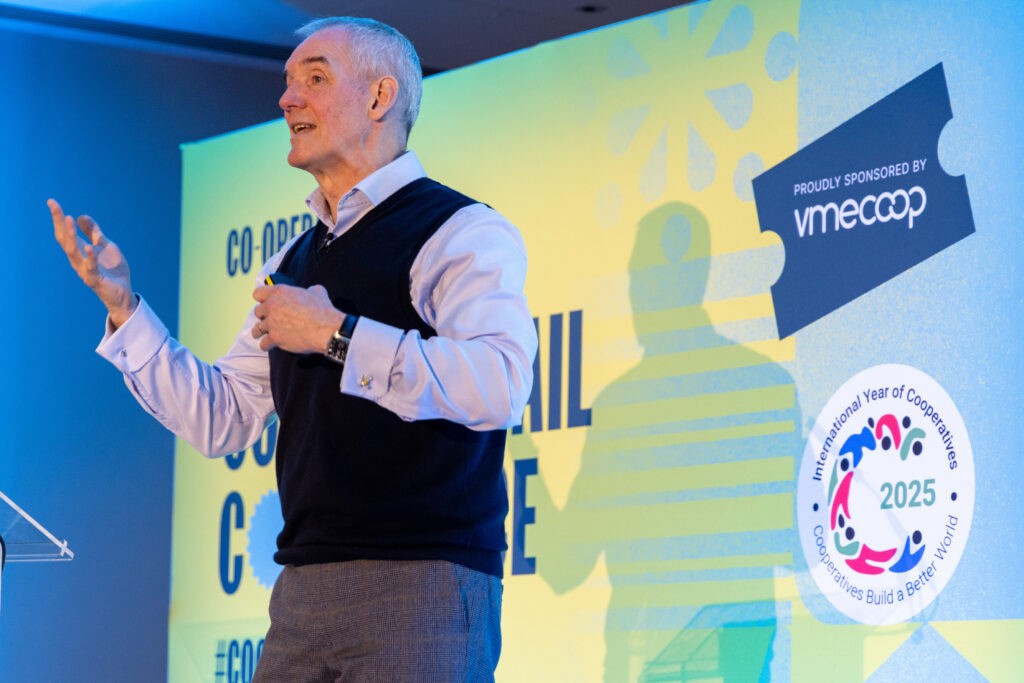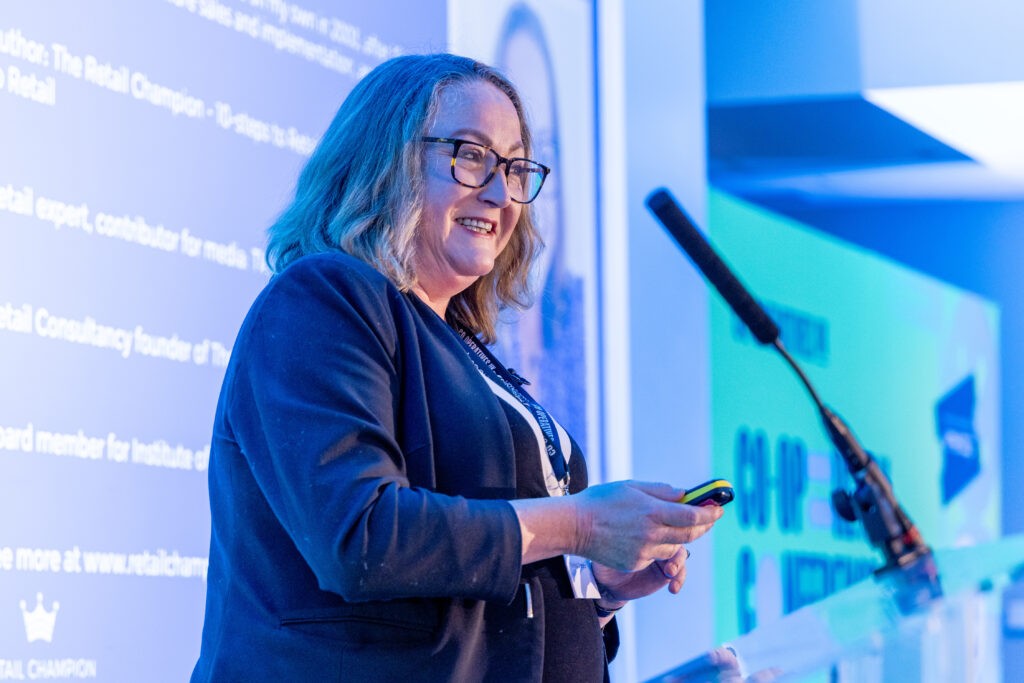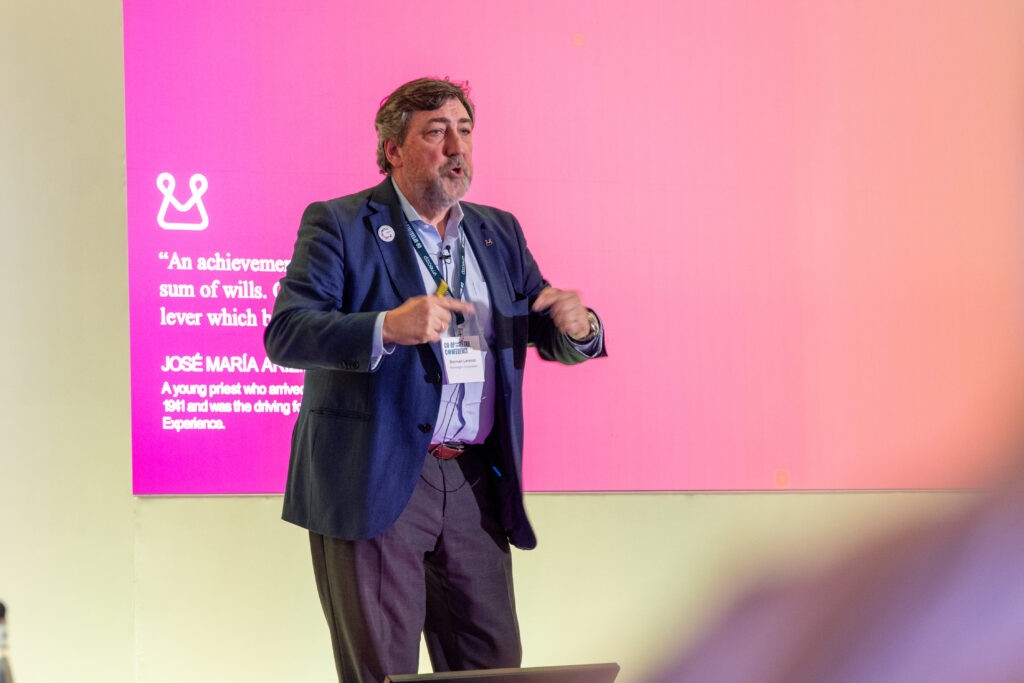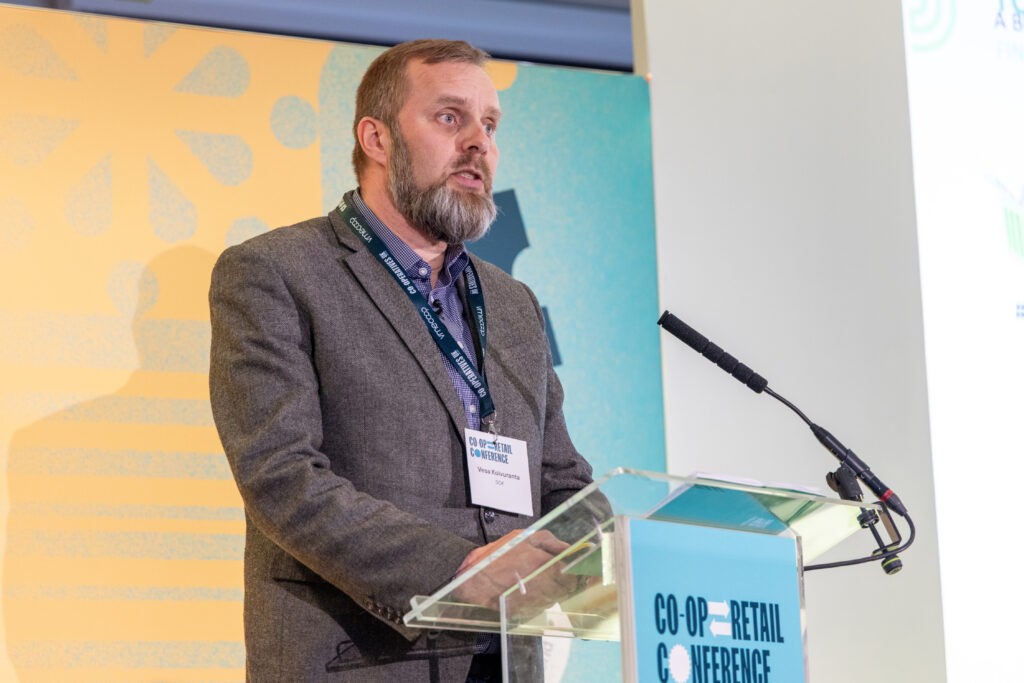Main photo: Retail CEOs Steve Browne, Karen Scott and Andy Rigby speak with Rose Marley (All images: Co-operatives UK / Chris Foster)
UK retailers are under pressure: grappling with increased operational costs due to higher National Insurance contributions and the National Living Wage, alongside new packaging levies. And consumers, already concerned about the cost of living, are adjusting their shopping habits by reducing grocery spending and seeking savings instead of staying loyal to certain shops or brands.
While the UK co-op landscape is dominated by consumer co-operatives, they are a part of a larger whole – and co-op shops, like the rest of the movement, need to up their game in terms of how they communicate their difference to ever-discerning shoppers.
Co-op retailers need to tell their stories better and tell them together, delegates were told at Co-operatives UK’s annual Retail Conference, held in Nottingham last month, in an event sponsored by VME Co-op for the seventh year running.
“We populated the world with co-ops,” said Co-operatives UK CEO, Rose Marley, “but in our own country, our story is not being told. How we can build this better world together?”
For this to happen, they need to work better together – something co-op retailers have long been nervy about, given UK competition law.
Related: Co-op Group announces increased profit of £131m but warns of ‘headwind costs’
And while the UK government has committed to doubling the co-op and mutual economy and the world is celebrating the second International Year of Cooperatives (IYC), awareness of the model among the general public remains woefully low. Storytelling is key to changing this, said Marley, describing how the co-op stories that resonate most with people tap into emotions, and demonstrate a tangible difference made to them personally.
“We need to start telling our hero stories, not just to each other, but to the world, and show people what co-operation means, not start explaining about the rule book,” she said. “We want to know that people have been surprised by co-ops and delighted by co-ops. We want people to understand what co-ops are.”
Over a packed conference weekend, directors, executives and colleagues heard from retail specialists, co-op practitioners and speakers who shared learnings and experiences that could support co-operative activity.

Graham McLean, commercial lead at retail analyst IGD, gave an overview of shopper behaviours, future retail outlooks and industry trends, highlighting that while automation will continue at pace, the biggest cost of a service is the cost of the people in it.
“People are costing more for organisations and will cost more because of legislative changes hitting soon,” he said, acknowledging the significance of this to co-operatives as people-led businesses. “But change is our normal,” he added, “and retailers need to accept and thrive – and be resilient and agile – within that.”
One way of achieving this comes back to storytelling, McLean said, as “people are bent and shaped” by external agendas.
“It’s the external environment, the stories they’re hearing, which is impacting [shopper confidence and behaviours] more than the actual cost of energy or groceries. It’s the perceptions that people are driven and drawn by … If you can help tell the right stories to the communities you are serving in some microscopic way, you can help them think and be more confident and positive.”
McLean also spoke about the changing nature of how shoppers perceive value (“What experience and rewards are they getting? How much time and money is it costing them? And is the organisation doing good?”) and the challenges of maintaining shopper loyalty and how shoppers are becoming more promiscuous and not as loyal to specific retailers. “Loyalty programmes need to focus on providing reasons for shoppers to be loyal over the long-term, not just immediate discounts or gratification,” he said.
Shopper experience and the nature of loyalty were highlighted by Clare Bailey, consumer consultant and founder of the Retail Champion, who discussed the importance of emotional connections in retail, and the need for “moments of joy” and storytelling to engage customers. Employee engagement, ethical practices, and community involvement all help drive loyalty and customer satisfaction, she said.
“Co ops have a unique advantage as retail evolves, to connect with customers at the emotional level – but the challenge is how to keep them feeling valued engaged when everybody else is vying for that share of wallet.”

Part of that value, Bailey argued, could be seeing communities at a hyper-local level, for example by “empowering store management – within guidelines – to do their own socials and their own blogs to tell their own stories and engage with their own customers … It’s a leap of faith because you might get some mavericks, but if you’ve recruited well and they’re living your values, then it could work.”
Values in the context of leadership succession – and the balance between internal and external talent acquisition – was discussed by three of the UK retail movement’s newest CEOs in post. Steve Browne (Heart of England), Karen Scott (Scotmid) and Andy Rigby (East of England) shared their visions for their respective societies and spoke about the need for collaboration, technology integration, and a more integrated leveraging of co-operative values.
“Succession planning is really important to us,” said Scott. “It minimises disruption and means you have built relationships and know the people, teams, processes and systems.”
Related: Meet … interview with Karen Scott
Scotmid’s Grow programme aims to develop the next generation of advisers and managers by teaching commercial, financial and operational aspects of the business. So far 191 have been through the programme, which has a 72% retention.
“My story of starting 23 years ago and getting to CEO inspires people I think,“ said Scott, “because it opens up what is the art of the possible – they can see that there is a pathway. But I don’t discount external appointments because it’s important that you get the right person for the job, and external candidates bring a fresh perspective and different ways to look at things.”
Rigby agreed. “You need to start with getting the right person for the job, and that means values alignment is important” – both the values of the person and the values of the organisation as a place for people to grow.
Another challenge for co-ops in the room, said Browne, is the complex nature of convenience retailing and the risk that “if you bring somebody from a larger retailer, they might be a specialist in just one particular area.” He admitted that before joining Heart of England, his view of independent societies was “probably quite stale … But I think actually some of the best thinking is going on amongst all of these heroes in this room.”
Browne added: “Karen is my hero on food to go, and Andy’s my hero when it comes to connecting the offers to the shop floor. We’re not devolved of each other, we’re connected, and we need to make the most of that.”
Acknowledging and utilising the most of the co-op difference, whilst sustaining a profitable business is vital, he added. “The concept of triple bottom line is not new to co-ops – we’ve been behind sort of people and and planets and ultimately, profitability for a long while, but clearly we’ve got to get profit before we can do everything else.”
“We’ve got to make a profit to make a difference,” Rigby agreed, “but then we need to make the most of our opportunities to be stronger together and combine and leverage the benefit of the cooperative values.”
“There’s a misconception that co-ops are not there to make money,” said Scott. “The fact is, we’re a commercial business and we need to make profit for us to put that back into our community and our people. Therefore we work very hard to do that. We’re as much a commercial business as any other retailers out there but our different democratic structure means we can better engage with our members, we do value their opinions; we’re not driven by bottom line.”
The panel agreed on the need to promote co-op values and make them modern and relevant. At Heart of England, this is through its redefined North Star strategy, a three-year plan that aligns its internal values.
East of England has also relaunched its vision, mission and values. “We’ve gone back to some of the cooperative values as the foundation of how we seek to lead,” said Rigby. “I think it’s really important as we move forward, we embrace elements of the past, embrace our differences, but move forward with that vision and mission to engage our colleagues and our members on that journey with us.”
All three were aligned on the need for independent co-ops to work better together. “We are all facing into a barrage of costs,” said Scott. “We have to find a route through competition law so that we can actually do more as a collective of societies because that is the one thing that actually stops us from doing more or moving quicker.”
Browne agreed. “This is the opportunity that we have, of reinventing convenience retail.”
The challenges faced in the UK are seen in retail elsewhere too, and this year, delegates had the opportunity to hear experiences from Finland and the Basque region of Spain.

Mondragon Corporation, founded in 1956, is a federation of 102 co-ops operating in industry, finance, retail, and knowledge – and stands as one of the world’s largest co-ops.
“We’ve always seen the world as a market, as an opportunity, which normally co-ops do not do,” said Mondragon’s Germán Lorenzo Ochoa. ”We feel that you cannot forget your roots, but you have to look forward and look further away.”
He described how Mondragon is a “socio-economic reality of an entrepreneurial nature” inspired by the principle of co-operative experiences. “We have to generate economic value, but by using our co-operative nature. We generate value with values.”
For Mondragon, the “business of business is people,” said Ochoa. “The way you treat people, educate them and respect them really makes a difference, So as co-operative leaders our real first endeavor in management is to develop our people and make them feel integral.”
The highest paid members of Mondragon are paid seven times the wage of the lowest-paid; 2024 headlines highlighted how Tesco’s CEO Ken Murphy’s pay was 431 times that of a median employee.
Related: Co-operative approaches to pay
“Co-ops have to make money,” he added, “but that money cannot ever be our final purpose. Our purpose is to transform society.”
In Finland, co-op retailers have been focusing on loyalty and what this means as a business and as members.
“Generally, our competitors aim to have loyal customers, said S Goup’s Vesa Koivuranta, “but we aim to be loyal to our customers. This small change in language makes a huge difference. For us it’s all about increasing member value, not just for today to raise members, but also for the future.”

Over 19 regional co operatives are part of S Group with over 40,000 employees and a combined turnover of €14bn. It includes hyper markets, supermarkets, convenience stores, hotels, restaurants, department stores, petrol stations and banking services. It is the market leader in the Finnish grocery business with a share of more than 48%.
The key, said Koivuranta, was to “accelerate our rate of change to meet customers expectation” in a world of digitalisation, polarisation and globalisation. “We need to raise the bar for our own performance and operational excellence. Customers expect cheaper, easier, faster, better and more sustainable products and services. They are asking us to make their everyday life easier.”
Trust was vital, he added. “We must continue to demonstrate that we are trustworthy and that our members can rely on the co-operative, particularly around data. Building a strong foundation of trust will be invaluable in the long run, and their data will be a major source of member value in the future.”
S Group makes three promises to its members: to give the best value for money; to provide what they need, when and how they need it; and that they can trust that everything has been managed properly and responsibly. “By keeping to these promises, we demonstrate real loyalty to our members.”
Co-op Party general secretary Joe Fortune shared how his organisation has grown its membership over the last election cycles by nearly 40%, grown its elected representatives to 1,600, and increased its campaign reach to 130,000 supporters. This has resulted in strong political influence and the ability to drive co-operative-friendly policies including in community-owned energy, Community Right to Buy, and integrating co-operative growth into legislation, he said.
Related: Co-op councils head to Mondragon for lessons in economic revival
While challenges remain, Fortune highlighted 2025 as an unprecedented opportunity. “We need to take all the passion and all the knowledge that we hold within our movement and spread it everywhere else. We can work together much better. We’ve got more expertise than we give ourselves credit for. We need to have a really good go at this.”
Over the weekend, delegates also heard from guest speakers who brought external perspectives on teamwork, sustainability and doing things differently.
Fashion designer, businessman and Great British Sewing Bee judge Patrick Grant described his journey from engineering to tailoring and his work with Community Clothing (CC). A social enterprise focused on sustainable fashion and UK manufacturing, CC’s mission is to support UK textile manufacturers, create sustainable jobs, and produce high-quality, affordable clothing. The organisation utilises British factories during seasonal production lulls, helping to keep skilled workers employed year-round.

And Kate Richardson-Walsh, who captained the Great Britain and England women’s field hockey teams for 13 years, shared her perspective on co-operating for success. Under her leadership, the team secured a bronze medal at the 2012 London Olympics and a historic gold at the 2016 Rio Olympics. She spoke candidly about different approaches to teamwork and leadership, mental health challenges and how success isn’t a single achievement.
“Success comes in many forms, and it’s about building those relationships, that sense of belonging and purpose, being empowered, having ownership and accountability, really caring about what you do and what you’re about,” she said.
Diversity is crucial as well: “The more difference you have the more resilient we can be, because the more solutions we will find.”
- This article was amended on 10 April to correct the number of co-ops and annual turnover of S Group.

